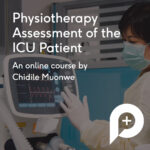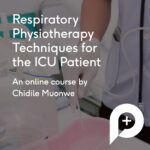Are you new to working in intensive care and you want to quickly learn the essentials to make a positive difference to your patients?
If you’re new to intensive care and you want to be able to confidently assess and manage your patients, this new programme of courses will take you through the essentails you need to know from day 1.
Each course is also accredited by the South African Society of Physiotherapy, the Austraialn Physiotherapy Council and The Texas Physical therapy Associaion so you can rest assured that this is a top quality course.
The Tutor – Chidile Muonwe
 Chidile is a Physiotherapist, Researcher and Lecturer in Nigeria with an interest in promoting and developing the role of physiotherapy in ICUs. He has a MSc from the University of Ibadan and is currently a Lecturer and Researcher at Nnamdi Azikiwe University. Chidile enjoys working in neurological rehabilitation as well as critical care, and is presently the Senior Manager for the Department of Neurorehabilitation at the Regions Healthcare.
Chidile is a Physiotherapist, Researcher and Lecturer in Nigeria with an interest in promoting and developing the role of physiotherapy in ICUs. He has a MSc from the University of Ibadan and is currently a Lecturer and Researcher at Nnamdi Azikiwe University. Chidile enjoys working in neurological rehabilitation as well as critical care, and is presently the Senior Manager for the Department of Neurorehabilitation at the Regions Healthcare.
Chidile has extensive clinical experience working in several hospital units including neurosurgical, paediatric, burn, orthopaedic as well as with individuals affected by stroke. He is dedicated to developing the role of a Physiotherapist within intensive care units (ICUs).

The Programme
The aims of this programme is to give you a complete overview of the assessment and physiotherapy management of patients within ICU. Currently there are five courses which make up the programme with more to follow.
The courses are accredited by the APC, SASP and TPTA so get your credits now!
Intensive Care Physiotherapy Programme

Physiotherapists, as part of the Intensive Care Unit (ICU) team, can be responsible for the respiratory care of critically ill patients in the ICU, as well as their early mobilisation and rehabilitation. Detailed and regular assessments of patients ensure appropriate treatment and progression for the patients in the ICU. In this programme, Chidile Muonwe will give an introduction to the ICU, patient monitoring, the Physiotherapist’s role, early rehabilitation, ICU acquired conditions, and caring for ventilated patients
Become Familiar with ICU
The Courses
Introduction to the Intensive Care Unit

Critically ill patients with life-threatening conditions need urgent, life-sustaining care which can only be provided in the Intensive Care Unit (ICU). ICU resources are however limited and the cost per patient high. Careful attention must, therefore, be given to determine which patients will most benefit from admission to the ICU and which type of ICU is best suited to each patient. In this course, Chidile Muonwe will cover the definition of intensive care and the ICU, different types of ICUs available, requirements for admission to ICU and why early physiotherapy is important in the ICU.
Understand & Familiarise Yourself with ICU
Monitoring of Patients in the Intensive Care Unit

Changes in vital signs are often the first indicators of patient deterioration in the ICU. They are, therefore, continuously monitored. Physiotherapists, as part of the ICU team, are not only responsible for the respiratory care of critically ill patients in the ICU, but also for their early mobilisation and rehabilitation. Any changes in an ICU patient’s position result in haemodynamic alterations which directly influence their vital sign status. It is, therefore, essential that physiotherapists have a thorough understanding of the vital signs of patients, as well as the necessity of continuous monitoring in order to guide their treatment sessions and alert them to possible patient deterioration.
Make Sense of Vital Signs
Physiotherapy Assessment of the ICU Patient

Physiotherapists play a vital role in the intensive care unit (ICU), not only in the management of respiratory conditions, but also in the rehabilitation and mobilisation of critically ill patients. The physiotherapy assessment of the critically ill patient is informed not so much by the medical diagnosis, but by the physiological and functional deficiencies of the patient. Physiotherapists follow a system-by-system approach to the evaluation of patients in the ICU in order to identify specific impairments that are amenable to physiotherapy intervention. These detailed and regular assessments ensure appropriate treatment and progression of treatment for the patient in the ICU.
Optimally Manage Your Patients
Respiratory Physiotherapy for the ICU Patient

Critical illness combined with bedrest results in general deconditioning which impacts many body systems, especially the respiratory system, placing ICU patients at a much higher risk of developing respiratory complications. Respiratory care is one of the primary functions of physiotherapy in the ICU and is aimed towards the prevention and resolution of respiratory complications. The primary goals of physiotherapy for respiratory dysfunction in the ICU include airway secretion clearance, recruitment of lung volume, optimisation of oxygenation and the improvement and maintenance of inspiratory muscle strength.
How to Apply SMART Goals in ICU
Respiratory Physiotherapy Techniques for the ICU Patient

Physiotherapists play a vital role in the respiratory management of patients admitted to the Intensive Care Unit (ICU). Patients in the ICU are critically ill, confined to bed and at times on mechanical ventilation which increases their risk for developing respiratory complications. The goals of physiotherapy for respiratory dysfunction in the ICU include airway secretion clearance, maintenance or improvement of lung volume, optimization of oxygenation, and maintenance or training of inspiratory muscle strength. A variety of physiotherapeutic techniques are at our disposal to facilitate meeting these goals which in turn assist in preventing respiratory complications from developing and mitigating any existing complications in order to facilitate optimal recovery of the patient.
Which Techniques Work Best in ICU?
 Chidile is a Physiotherapist, Researcher and Lecturer in Nigeria with an interest in promoting and developing the role of physiotherapy in ICUs. He has a MSc from the University of Ibadan and is currently a Lecturer and Researcher at Nnamdi Azikiwe University. Chidile enjoys working in neurological rehabilitation as well as critical care, and is presently the Senior Manager for the Department of Neurorehabilitation at the Regions Healthcare.
Chidile is a Physiotherapist, Researcher and Lecturer in Nigeria with an interest in promoting and developing the role of physiotherapy in ICUs. He has a MSc from the University of Ibadan and is currently a Lecturer and Researcher at Nnamdi Azikiwe University. Chidile enjoys working in neurological rehabilitation as well as critical care, and is presently the Senior Manager for the Department of Neurorehabilitation at the Regions Healthcare.
 Physiotherapists, as part of the Intensive Care Unit (ICU) team, can be responsible for the respiratory care of critically ill patients in the ICU, as well as their early mobilisation and rehabilitation. Detailed and regular assessments of patients ensure appropriate treatment and progression for the patients in the ICU. In this programme, Chidile Muonwe will give an introduction to the ICU, patient monitoring, the Physiotherapist’s role, early rehabilitation, ICU acquired conditions, and caring for ventilated patients
Physiotherapists, as part of the Intensive Care Unit (ICU) team, can be responsible for the respiratory care of critically ill patients in the ICU, as well as their early mobilisation and rehabilitation. Detailed and regular assessments of patients ensure appropriate treatment and progression for the patients in the ICU. In this programme, Chidile Muonwe will give an introduction to the ICU, patient monitoring, the Physiotherapist’s role, early rehabilitation, ICU acquired conditions, and caring for ventilated patients



